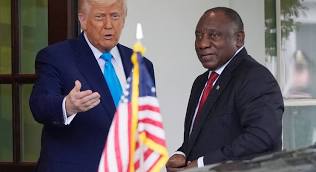Photo caption from left: US President Donald Trump and South African President Cyril Ramaphosa
*South Africa is looking to U.S. LNG over a period of 10 years.
*South Africa is also exploring areas of cooperation with the U.S. in various technologies, including fracking.
*South Africa currently imports most of its gas from Mozambique via pipeline, with Mozambique’s $20 billion natural gas and LNG project facing repeated delays.
South Africa has proposed to buy liquefied natural gas (LNG) from the United States over a 10-year period as the country looks to secure a trade deal with the Trump administration, a ministerial statement by the South African government has revealed. South Africa plans to import 75 to 100 million cubic metres of LNG per year from the U.S., the world’s top LNG exporter. According to Khumbudzo Ntshavheni, South Africa’s Minister in the Presidency, the deal would “unlock approximately $900 million to $1.2 billion in trade per annum and $9 billion – $12 billion for 10 years based on applicable price.” According to Ntshavheni, U.S. LNG will not replace South Africa’s current supplies but rather complement them.
Ntshavheni, South Africa’s cabinet spokesperson, said her country would also explore areas of cooperation with the U.S. in various technologies, including fracking, to help unlock the country’s gas sector. South Africa’s Karoo region holds significant gas reserves, however, the country has a moratorium on shale gas exploration over environmental grounds. The proposed trade package also includes a quota of 40,000 vehicles per year to be exported duty-free from South Africa; duty-free supplies of automotive components sourced from South Africa; 385 million kilograms of duty-free steel per year and 132 million kg of duty-free aluminium per year.
South Africa’s President Cyril Ramaphosa is credited with proposing the LNG deal during his visit to the White House a week ago, when U.S. President Donald Trump blamed him for “genocide” against white farmers and controversial government policies, such as black economic empowerment and land reforms. Ramaphosa had hoped to use the meeting to mend fences with the Trump administration after Trump cancelled aid to South Africa, accusing the government of committing “egregious actions.” South Africa-born billionaire and a Trump super-ally, Elon Musk, has condemned the South African leadership for supporting “openly racist policies.”Musk is considered to be a big reason behind the animosity towards South Africa by the Trump administration, where white South Africans disproportionately control most of the country’s land and wealth despite constituting just 7% of the population. Back in March, Marco Rubio, U.S. secretary of state, declared South Africa’s ambassador to the U.S., Ebrahim Rasool, persona non grata and expelled him from the country. The administration has criticised South Africa’s genocide court case against Israel.
South Africa currently imports most of its gas from Mozambique via pipeline, with Mozambique’s $20 billion natural gas and LNG project facing repeated delays. The project was halted in 2021 due to violence in the Cabo Delgado region, specifically an attack by Islamic State-linked militants. TotalEnergies (NYSE:TTE) is currently seeking approval from the Mozambican government to lift a force majeure declaration on the project, and hopes to start production by 2029. Total is the project’s main operator with a 26.5% stake, followed by Japan’s Mitsui & Co with 20%, while Mozambique’s state-owned ENH owns a 15% stake. Despite the violence, the project is viewed as crucial for the region’s economy and Mozambique’s economy, with the Southern African country projected to earn US$23 billion from the Coral Norte project over three decades. The LNG plant will liquefy 13.12 million metric tons of natural gas per year (tpy).
Whereas 18 African countries produce some natural gas, Algeria, Egypt, and Nigeria account for nearly 90% of all gas produced on the continent. Nigeria has the continent’s largest gas reserves at 206.5 trillion cubic feet. The oil and gas sector in Africa’s most populous country is responsible for 95% of the country’s foreign exchange earnings and 20% of GDP.
Currently, Africa has several big LNG projects in progress or awaiting FID (Final Investment Decision). These include Rovuma LNG, Coral North FLNG, Mozambique LNG, and Tanzania LNG. These four projects will be instrumental in ramping up the continent’s LNG export capacity over the next decade. The Coral South FLNG is a floating liquefied natural gas (FLNG) facility located offshore Mozambique, specifically in the southern part of Area 4 of the Rovuma Basin. It is designed to process 450 billion cubic meters of natural gas from the Coral reservoir, liquefying 3.4 million metric tons annually for export. The facility is the first FLNG deployed in deep waters on the African continent. Meanwhile, Rovuma LNG is a 12-train project with a total capacity of 18 million tpy; Mozambique LNG has a total export capacity of 43 million tpy while Tanzania LNG will provide 10 million tpy worth of capacity.
=== Oilprice.com ===



